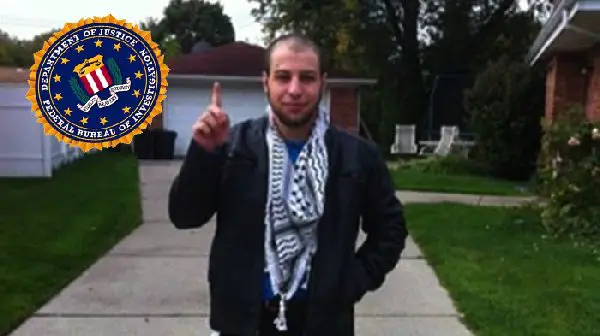
|
| Khalil Abu-Rayyan |
DETROIT — The Dearborn Heights man accused of supporting ISIS and planning an attack on a church was seduced and manipulated by an FBI agent, his attorney said.
At a detention hearing on Tuesday afternoon, Todd Shanker, the court-appointed attorney of 21-year-old Khalil Abu-Rayyan, argued that his client is not a danger to the community.
He said an FBI undercover operative approached Abu-Rayyan romantically and tried to radicalize him.
Abu-Rayyan is charged with illegal firearm and marijuana possession, but a legal complaint against him claims he supported ISIS and told an undercover agent that he wanted to “shoot up” a church in Detroit. He is not facing any terrorism-related charges.
The prosecutor said on Tuesday that the defendant had made delusional statements that demonstrate mental illness when corresponding with the undercover agent.
Shanker said the FBI informant reached out to Abu-Rayyan after he had been arrested for marijuana possession in November, at a time when he was feeling depressed and vulnerable.
According to Shanker, the undercover agent posed as a 19-year-old Iraqi American named Jenna Bride.
Bride had told Abu-Rayyan that her cousins were killed by Shi’a militants in Iraq, and she was married to a man who died fighting for ISIS in Syria, the lawyer added.
According to Shanker, the defendant conveyed to Bride multiple times that he does not want to hurt people.
“She’d tell him, ‘you’re a fake,'” Shanker said.
He added that Abu-Rayyan and the informant did not correspond for a few days because of a disagreement. Then, the Bride sent Abu-Rayyan a broken heart in a Twitter message, saying “Why are you abandoning me?”
The FBI affidavit says Abu-Rayyan told the informant he had bought a rifle, a “bunch of bullets” and a mask to attack a local church. The attorney said Abu-Rayyan was lying and boasting to impress Bride, as the bureau did not find a rifle or matching bullets upon searching the suspect’s residence. The FBI did find a plastic red mask at Abu-Rayyan’s father’s business, where he worked. But according to Shanker, Abu-Rayyan’s father had owned the mask for several years and wore it on Halloween.
“When you look at the totality of this, there’s a reason why there’s no terrorism charge,” the attorney said.
Abu-Rayyan was arrested in November after Detroit Police officers found a handgun and marijuana in his car. Shanker said Abu-Rayyan had bought the gun for personal protection at work. After his release, Abu-Rayyan tried to apply for a Concealed Pistol License, which his lawyer said was an attempt to acquire a gun legally for the same purpose.
He said the gun Abu-Rayyan originally bought is one of the smallest and slowest guns and would not be effective in a terrorist attack.
“He has no criminal background… He is an extraordinarily hard-working man,” Shanker said of Abu-Rayyan.
But Assistant U.S. Attorney Ronald Waterstreet rebuked Shanker’s argument, saying that Abu-Rayyan showed signs of extremism long before he met Bride.
Abu-Rayyan encountered Bride after his arrest in November 2015. But according to Waterstreet, he had been sharing brutal ISIS execution footage on social media as early as July.
Waterstreet said after an ISIS supporter described a video of killing people by throwing them from the top of buildings than shooting them, Abu-Rayyan requested a link to the footage.
The defendant reposted the link and commented, “Thank you brother. That made my day.”
Abu-Rayyan also posted another 22-minute video featuring executions by ISIS, bragging that he watched it five times that day. The prosecutor said he could only watch a few minutes of the segment because of its cruelty.
Waterstreet said with the mixture of mental illness, drug abuse and ISIS support, Abu-Rayyan poses a threat to society.
Shanker said the government should have contacted Abu-Rayyan’s family about the videos, instead of sending an informant to radicalize his client.
Magistrate Judge Steven Whalen agreed with the prosecution and ordered Abu-Rayyan’s detention until his legal proceedings move further.
Whalen said the fact that Abu-Rayyan has no criminal background does not guarantee that he will not harm people, citing the San Bernardino shooters’ clean criminal record.
However, Whalen expressed sympathy for the defendant’s family, saying that he has no reason to believe they are not good citizens.
Questions of competence
At the beginning of the hearing on Monday, Waterstreet questioned Abu-Rayyan’s mental capacity to stand trial. The prosecutor revealed details that were left out of the criminal complaint alleging that Abu-Rayyan supported ISIS.
According to Waterstreet, Abu-Rayyan had told Bride that Satan talks to him at night and tells him to do “bad things,” including harming people.
Abu-Rayyan told the undercover agent that the devil looks and sounds like the suspect himself.
Waterstreet said the informant asked Abu-Rayyan if he wants to behead people for ISIS or for himself, and the defendant answered, “Just for me.”
“I think I do need help,” the suspect told Bride, according to the prosecutor.
Waterstreet cited a family member saying the mental health stigma in the Arab American community may have prevented Abu-Rayyan from receiving treatment.
But Shanker insisted that his client is competent.
The judge asked Abu-Rayyan if he understands the charges leveled against him.
“I’m here for possession of firearm while being an unlawful user of marijuana,” Abu-Rayyan responded.
The defense attorney then proceeded asking Abu-Rayyan simple general questions, which the defendant answered correctly.
Shanker said Abu-Rayyan may have mental issues but he is competent enough to aid in his own defense and understand the legal ramifications of his case.
The judge denied the prosecution’s request for a competence hearing.
“Your honor, can I please hug my father,” Abu-Rayyan asked Whalen at the end of the session.
The judge left the matter up to the federal marshals in the courtroom. They denied the request.






Leave a Reply